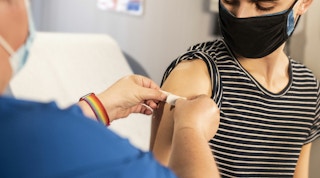Cookies in use
Human Rights Campaign Commends World Health Organization for Declaring Monkeypox a Global Health Emergency
by Aryn Fields •

The Human Rights Campaign commended the World Health Organization (WHO) for taking the step to declare the monkeypox virus (MPV) a global health emergency. The designation means the WHO views the outbreak as a significant threat to global health, requiring a coordinated international response. The last time a global health emergency was declared was in 2020, in response to COVID-19.
According to the CDC, as of July 23, there were 2,891 confirmed cases of MPV in the U.S., though this number is likely an undercount due to limited testing capacity. The Human Rights Campaign has been closely monitoring the monkeypox outbreak in the United States, especially as the virus spreads primarily among gay and bisexual men and transgender women.
This designation must serve as an alarm to public health officials and governments around the world that combatting monkeypox is a top priority; it is critical to rapidly increase testing capacity and vaccine distribution in order to reach communities most impacted by the virus, particularly gay and bisexual men and transgender women, who comprise the majority of current cases. A public health response that does not center equitable care and treatment is a failed response. We are especially concerned that BIPOC and LGBTQ+ people who face greater challenges in accessing healthcare will bear the brunt of MPV. The LGBTQ+ community will continue to do what we have done for decades—care for one another, be compassionate and empathetic, and advocate for our community’s well being.
In an effort to get accurate and timely information to the LGBTQ+ community, HRC launched a resource page that lays out what the virus is, how it spreads, symptoms to watch for and current vaccine information, among other crucial information based on CDC and HHS guidance. MPV is a rare but potentially serious, viral illness that typically involves flu-like symptoms, accompanied by a rash, which may look like pimples or blisters. This virus can be transmitted to anyone, anywhere through close, personal, often skin-to-skin contact.
Health officials note that high rates amongst MSM could be due to gay men being more proactive toward their sexual health (seeking testing, treatment, knowledge sharing) compared to other communities. It’s critically important that we provide a clear, scientific, evidence-based response to prevent the dissemination of misinformation, which might stigmatize LGBTQ+ people. Causing unnecessary fear will potentially endanger lives and lead to destructive policies. Every person, no matter your sexuality or gender identity, should take proper precautions and listen to guidance from health officials in order to stay safe.
Contact Us
To make a general inquiry, please visit our contact page. Members of the media can reach our press office at: (202) 572-8968 or email press@hrc.org.
Love conquers hate.
Image:
HATE WON'T MAKE US GREAT!
100% of every HRC merchandise purchase fuels the fight for equality.